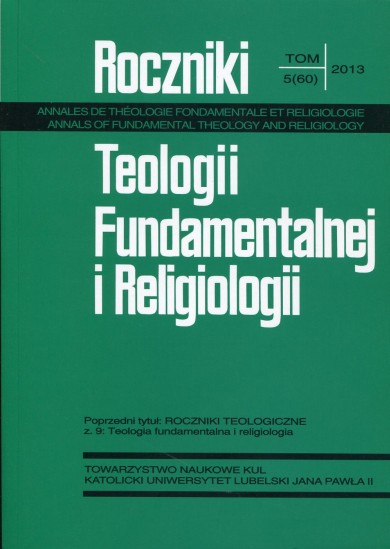Terminy “magia” i “czarownictwo” w swietle badan etnologicznych i religioznawczych
THE TERMS MAGIC AND WITCHCRAFT IN THE LIGHT OF ANTHROPOLOGICAL AND RELIGIOUS STUDIES
Author(s): Henryk ZimońSubject(s): Christian Theology and Religion
Published by: Katolicki Uniwersytet Lubelski Jana Pawła II - Wydział Teologii
Keywords: MAGIC; SORCERY; WITCHCRAFT; MAGICIAN; SORCERER; WITCH; WITCH-DOCTOR; DIVINATION; EVIL EYE; ANTI-WITCHCRAFT MOVEMENTS
Summary/Abstract: The subject of the article is a terminological reflection on the definition and interpretation of magic and witchcraft in the light of research by anthropologists and scholars of religion from the second half of the XIX c. to contemporary times. The views of evolutionists E. B. Tylor and J. G. Frazer, sociologists E. Durhheim, H. Hubert and M. Mauss, social anthropologist B. K. Malinowski, philosopher E. Cassirer and structuralist C. Lévi-Strauss are discussed. The principle criterion differentiating religion from magic is man referring to supernatural powers and beings. Practicing magic is socially approved of and has as its goal the good of an individual or social group. In the life of nonliterate peoples, religion and magic are united and that is why we speak of the religious-magical character of their beliefs, rituals and behaviour. Contemporary anthropologists and scholars of religion treat magic and religion as a field complementary and closely related with each other in the cultures of nonliterate peoples. Magic must be differentiated from witchcraft, whose goal is to conjure evil upon a person or community. E. E. Evans-Pritchard identified among the Azande people (southern Sudan) two types of wizardry: acquired sorcery which meant that the sorcerer consciously uses mixtures, spells and rites attempting to conjure evil and inborn witchcraft in which the witch based upon inherited psychic power unconsciously injures others by sending or activating a certain substance. This division is not universally applied in Africa, since inborn witchcraft appears much more rarely among African peoples than acquired sorcery. Faith in charms fulfils a cognitive, psychological, social, political and legal role. At the dawn of modern transformations in Africa, witchcraft is linked with jealousy, hidden aggression, social and economic inequality and the desire for power. On the one hand, Africanists stress the increase in witchcraft practices and a return to anti-witchcraft movements, and on the other hand, they draw attention to the fact that modernization and secularization related with it slowly contribute to lessening searching for explanations of misfortunes, illness and death in witchcraft beliefs.
Journal: Roczniki Teologii Fundamentalnej i Religiologii
- Issue Year: 2011
- Issue No: 3 (58)
- Page Range: 167-197
- Page Count: 31
- Language: Polish

